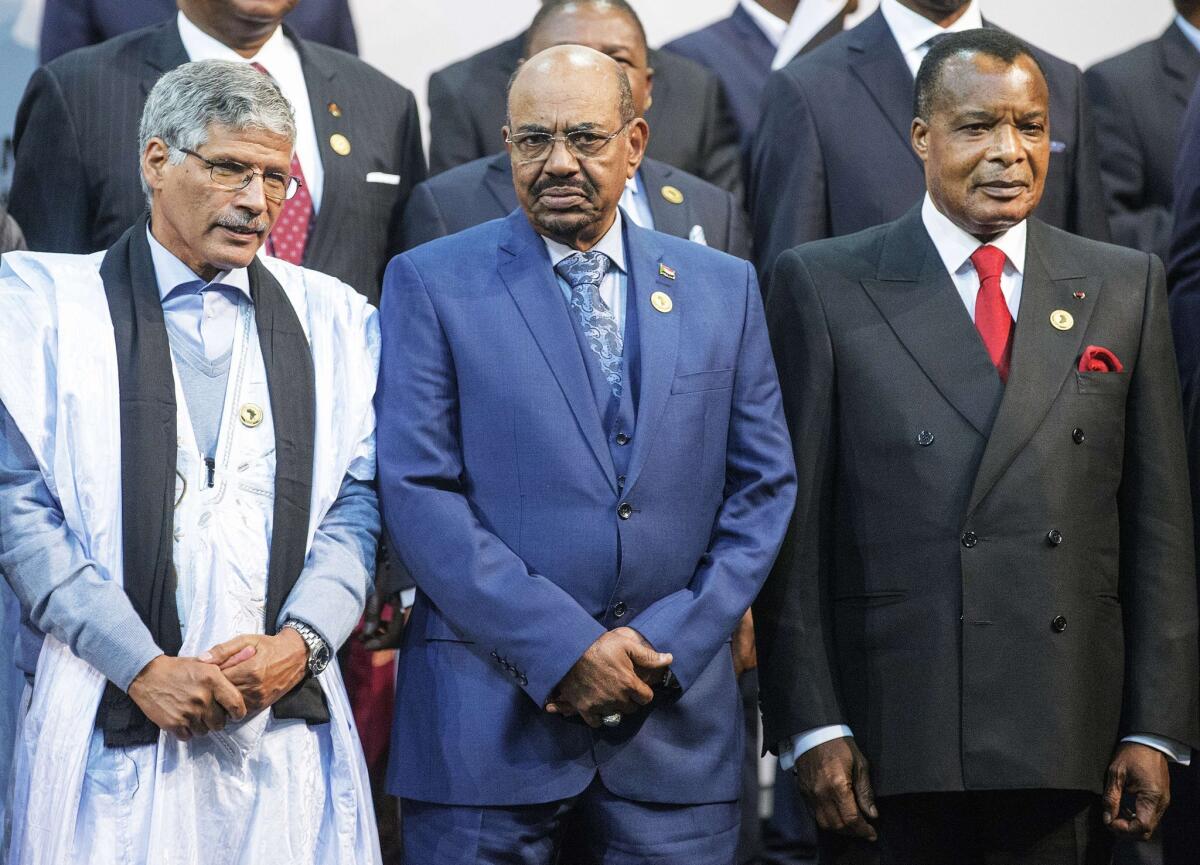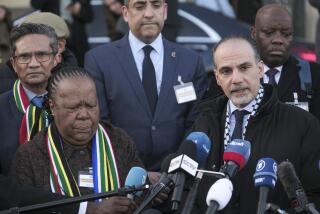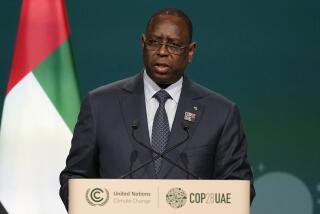Wanted for genocide, Sudan’s president barred from leaving South Africa

Abdelkader Taleb Oumar, prime minister of the Sahrawi Arab Democratic Republic, left, poses with Sudan’s president, Omar Bashir, and Congo’s president, Denis Sasso-Nguesso, at the 25th African Union summit in South Africa on Sunday. The International Criminal Court has ordered South Africa not to let Bashir leave the country.
South Africa’s government faced embarrassment Sunday when a court ordered authorities to prevent the president of Sudan from leaving the country after an African Union summit, even though the government had promised immunity to all summit participants.
Sudan’s Omar Hassan Ahmed Bashir faces charges of crimes against humanity and genocide in the International Criminal Court. As a member state, South Africa is obliged to arrest him.
Under the interim order by a South African judge, Bashir is not allowed to leave the country before a court hearing Monday on an application from a human rights group to force his arrest and transfer to the International Criminal Court.
Bashir was indicted in 2009 and 2010 over genocide for unleashing militias against the population in Darfur in a conflict that killed more than 300,000 people, according to United Nations figures.
Since then, however, Bashir has traveled to various African countries without being arrested. This was his first trip to South Africa since the arrest warrants were issued.
The South African Litigation Center, a legal and human rights group, filed the application in Pretoria’s High Court on Sunday.
Judge Hans Fabricius said a failure to arrest Bashir would bring South Africa into disrepute and ordered that all border posts be ordered not to allow the Sudanese president to depart.
The South African government failed in a bid to have the application thrown out of court on the basis that playing host to the African Union summit overrode its obligations under the Rome Statute that established the International Criminal Court, local media reported.
One South African television station, Eye Witness News, reported that Bashir was planning to defy the court order and fly out of South Africa overnight.
The order read: “President Omar al-Bashir is prohibited from leaving the Republic of South Africa until a final order is made in this application and the respondents are directed to take all the necessary steps to prevent him from doing so.” The respondents included South Africa’s Home Affairs department and police.
Bashir’s visit wasn’t announced and appeared unexpected. Local media reported that no place had been set for him at lunch after the closed session of leaders. He later posed with other leaders for the traditional group photograph.
The South African government asked for the case to be adjourned until Monday, when the application will be heard.
The International Criminal Court was set up with the support of many African states, but in recent years, African Union opposition to it has grown. Kenya has led opposition to the court after the election of Uhuru Kenyatta as president, despite facing International Criminal Court charges for crimes against humanity.
The charges against Kenyatta were recently dropped. A prosecutor for the court, Fatou Bensouda, accused the Kenyan government of refusing to cooperate with investigators.
Bensouda requested South African authorities to fulfill the country’s obligations and arrest Bashir, the Associated Press reported.
Follow @RobynDixon_LAT on Twitter for news from Africa.
More to Read
Start your day right
Sign up for Essential California for news, features and recommendations from the L.A. Times and beyond in your inbox six days a week.
You may occasionally receive promotional content from the Los Angeles Times.






